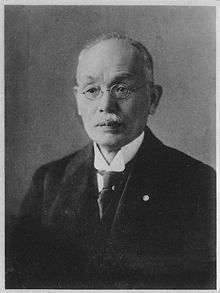Inoue Tetsujirō
Inoue Tetsujirō (井上 哲次郎, February 1, 1855 – December 7, 1944) was a Japanese philosopher who condemned Christianity as incompatible with Japanese culture and considered its followers "inherently disloyal" to Japan. He compiled A Dictionary of Philosophy (哲学字彙, Tetsugaku jii), which was first published in 1881, again in 1884, and finally in 1912.

He was also a member of the International Education Movement. He wrote a commentary on Japan's Imperial Rescript on Education, wherein he encouraged the Japanese people to support the state and imperialism.[1] Inoue's support of imperialism established him as opposed to the ideas of other proponents of International Education, such as Shimonaka Yasaburo, Noguchi Entaro, and Izumi Tetsu.
Inoue was the most prolific and prominent promoter of bushido ideology in Japan before 1945, authoring dozens of works and giving hundreds of lectures on the subject over almost half a century.[2]
Chinese poems
After graduating from Tokyo Imperial University he composed Chinese poems, one of which inspired the composition of the poem "White Aster" by Ochiai Naobumi.
References
- Dummings, William E. Education and Equality in Japan. Princeton University Press, Princeton, NJ; 1970.
- Oleg Benesch. Inventing the Way of the Samurai: Nationalism, Internationalism, and Bushido in Modern Japan. Oxford: Oxford University Press, 2014. ISBN 0198706626, ISBN 9780198706625
- Eddy Dufourmont.Is Confucianism philosophy ? The answers of Inoue Tetsujirō and Nakae Chōmin, in Nakajima Takahiro ed.,Whither Japanese Philosophy? II Reflections through other Eyes (UTCP Booklet 14), 2010, p. 71-89.
http://utcp.c.u-tokyo.ac.jp/publications/pdf/UTCPBooklet14_04_Dufourmont.pdf
External links
Les Sectes bouddhiques japonaises, E.Steinilber-Oberlin, K. Matsuo, Paris 1930, pp. 293/4